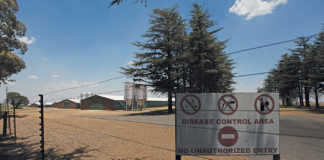
Photo: Supplied
What are the greatest challenges faced by young black farmers?
They lack appropriate support to help them access markets, finance, training, inputs and mentorship. A big challenge is also knowing where to get assistance with whatever issues arise on the farm.
EVENT: Join us on tour to Fruit Logistica 2018
Are female black farmers’ challenges significantly different?
In general, black female farmers face challenges similar to their male counterparts. However, some young female farmers receive very little support from their families, who still hold on to traditional ideas and believe that women cannot run their own businesses.
This is becoming very rare though, so young female farmers mostly struggle with making strides in the industry because they lack access to appropriate support.
Which expectations should young black farmers discard?
They should change the mindset that someone else is coming to save them. They have to realise that while things are the way they are, with poor access to appropriate support, it is up to them to find their way and make things happen.
They must understand that they will be required to be proactive in finding solutions to their challenges, which may mean reading up on, and researching things on their own, exposing themselves to the industry through organised agriculture, and learning from like-minded people.
READ Mentorship – the good, the bad and the ugly
They must reach out to experienced farmers, yet appreciate that no one owes them anything; it is their own efforts that will pay off. Lastly, they should recognise the importance of their position in society and take pride in what they do, which is contributing to feeding the country.
What skills are most lacking among young farmers?
Financial management is often right at the top of the list, as it is with most entrepreneurs. Technical production skills are also lacking.
Some young farmers don’t want to work with organised agriculture. Why?
I believe it’s because they haven’t been exposed to any organisations that have showcased the support given to other young farmers like themselves.
So they don’t see the relevance or worth. I don’t blame them because they probably put a great deal of effort into their work on the farm, and don’t want to invest more time or money elsewhere if they’re not confident of getting the results they expect.
They may need more persuading, with real stories about youth who have progressed Farmers in organised agriculture. Sometimes it’s also out of ignorance, as they haven’t been exposed to opportunities that may be relevant to them.
How will new farmers benefit from joining organised agriculture?
They could end up receiving appropriate support and connecting with other farmers to share experiences or collaborate. They could also gain a greater understanding of industry issues, which they would not be exposed to by simply working on the farm.
This, in turn, could change how they see themselves and their businesses, and give their enterprises new direction.
How can young farmers learn independently?
The Internet is probably the most practical source. Young farmers can find information on production processes, business advice, and the agricultural sector in general, on organisations’ websites, government department websites, online farming publications, and even social media.
Another source for self-education is farmers’ study groups, as it enables the young farmer to learn directly from others’ experience.
What advice would you give to young farmers applying for business loans?
They first need to understand what stage their business is at: start-up or developmental.
READ DAFF going from bad to rotten
Then they need to research, possibly using the Internet, the types of institutions that can provide the right type of finance for their businesses at their stage of development.
Once they have identified the right institution, they then need to understand the financial products available for their operations, and the right questions to ask when they email or phone the institution.
They should also record all aspects of their businesses to create a paper trail. This will help when completing application forms as the required information will be readily available.
How can young black farmers enter into established value chains?
They have to be recognised by the established organisations already in the value chain, and provided with preferential and targeted opportunities so that they can participate.
They also need to educate themselves on the benefits of being in the value chain, and find ways to expose themselves to the industry, which is where the real opportunities are. Young farmers have much work to do once they have been exposed to an opportunity.
They need to stay dedicated and do their part to benefit from such opportunities. It would also help if a one-stop shop were created for the youth to access such opportunities.
How big a role does mentorship play in establishing new farmers?
Huge! I doubt that any large commercial farmer ever got to where he or she is today without being mentored at an early stage. Thus, I believe this is a very important element in the development of any new farmer.
I know that many young farmers are managing to get by – only just – without any mentors, but I would highly recommend that they get someone they can turn to for advice and guidance.
Do you think government takes young farmers seriously, and truly realises their potential?
The Department of Agriculture, Forestry and Fisheries is working on an initiative to promote youth participation in agriculture. In 2016, it introduced #YAFF, an initiative championed by Deputy Minister Bheki Cele.
#YAFF focuses on the Youth in Agriculture, Forestry and Fisheries Awards, which attempts to identify promising young farmers and encourage them to apply for the awards.
It then partners the winners with players in the industry to provide support for the young farmers’ growing agribusinesses.
However, in my experience and that of others, the department is not doing enough. Awards are once-off events and they’re not sufficient to provide the much-needed support on the ground that many young farmers require.
Email Dimakatso Nono Sekhoto at [email protected].









